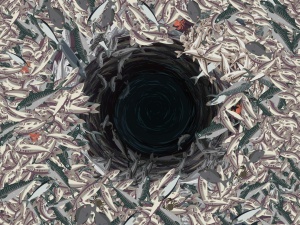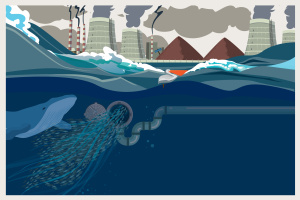European farmed animals consume wild fish which could contribute to feeding 33 million West Africans
Every year, European companies contribute to the diversion of fresh fish that could provide essential protein for over 33 million people in the West African region, undermining food security, poverty alleviation and sustainable development progress, reveals a new research from NGOs Greenpeace Africa and Changing Markets.
The report, Feeding a Monster: How European aquaculture and animal feed industries are stealing food from West African communities, identifies more than half a million tonnes of small pelagic fish are extracted every year along the coast of West Africa to be converted into feed for aqua and agriculture farming, dietary supplements, cosmetics and pet food products outside the African continent. [1]
“The fishmeal and fish oil industry, as well as all governments and companies supporting them, are basically robbing local populations of livelihoods and food in contradiction with international commitments on sustainable development, poverty alleviation, food security, and gender equality,” warns Dr Ibrahimé Cissé, Senior Campaigner at Greenpeace Africa.
The new report examines the impact of the growing aquaculture industry in Europe and its reliance on wild fish / fish meal fish oil (FMFO) trade from West Africa.
According to the UN Food and Agriculture Organization (FAO), the main fish species the FMFO industry in West Africa uses – sardinella and bonga – are already overexploited, posing ‘a serious threat to food security in the subregion’.[2] Europe is home to several of the world’s largest aquafeed companies – Cargill Aqua Nutrition/EWOS, Skretting, Mowi and BioMar. These companies have been connected to West African FMFO suppliers, revealing their complicity in the significant decline of fish stocks in the midst of the region’s food crisis.
The report also identifies supply chain relationships between seafood processors, distributors and farmed fish producers that have been sourcing aquafeed from companies involved in FMFO trade from West Africa. Major retailers across Europe have been linked to the FMFO trade from West Africa including E.Leclerc and Carrefour in France, Edeka in Germany, Mercadona in Spain and Tesco and Sainsbury’s in the UK [2] (full list in notes to editors). The companies were contacted and offered an opportunity to respond in advance of publication.
Alice Delemare Tangpuori, Campaigns Manager, Changing Markets, commented: “Exports of FMFO to Europe are stealing the livelihoods of coastal communities, by depriving populations of an important food source and means of income. European aquafeed companies and retailers can no longer ignore this major human rights and environmental issue. Now is the time to rethink supply chains and rapidly phase out the use of wild-caught fish in farmed fish and other animals, to preserve these fish populations for future generations.”
West Africa’s production of fishmeal and fish oil (FMFO) has grown more than ten-fold in the past decade, from around 13,000 tonnes in 2010 to over 170,000 tonnes in 2019, making the region one of the biggest suppliers for the global market. []
The research confirms the practice is undermining food security in coastal communities of Mauritania, Senegal and The Gambia, particularly in Mauritania where 70% of the fish oil exports went to the EU in 2019.
Globally, 69% of fishmeal and 75% of fish oil is used for aquafeed to produce farmed fish, such as salmon and trout. Roughly one-third of fishmeal goes to the agricultural sector, 23% of which goes to feed pigs. The aquaculture industry is already providing over half of global fish consumption and is expected to grow further to reach 60% of total global fish consumption by 2030.
The report finds governments of Mauritania, Senegal and The Gambia have so far failed to properly manage their common small pelagic fish resource, as well as to take the appropriate measures to ensure the right to food and livelihood for their impacted communities, including the artisanal fishing sector, who continue to protest against the FMFO factories.
“During the cold season in Senegal it is very difficult, if not impossible, to find sardinella at the usual landing points. The consequences on the food and nutritional security of populations are catastrophic as well as on the balance of the food chain at sea,” said Dr Alassane Samba, Former Director of Research and Director of the Dakar-Thiaroye Oceanographic Research Center in Senegal. [3]
Harouna Ismail Lebaye, President of FLPA (Artisanal Fishing Free Federation), Nouadhibou section, in Mauritania, sends a strong message to companies and governments involved in FMFO sourcing: “Your investments rob us of our fisheries resources, your investments starve us, your investments threaten our stability, your factories make us sick. It’s time to stop, now.”
Greenpeace Africa and Changing Markets are calling on:
West African governments to:
- Phase-out FMFO production using fish fit for human consumption, based on its negative environmental, social and economic impacts.
- Grant women, fish processors and artisanal fishermen a legal and formal status. Opening access to labour rights and benefits, such as social security and consultation rights in local fisheries management.
- Establish an effective regional fisheries management regime for the exploitation of shared resources such as small pelagic fish; this management regime should comply with a precautionary and ecosystem-based approach, ensuring that fish catches are within safe biological limits.
Companies involved, including retailers:
- Immediately stop trading FMFO produced using fish fit for human consumption from the West Africa region.
- Comply with stricter regulations on due diligence and transparency in aquafeed and livestock feed supply chains.
- Put in place a roadmap for eliminating the use of FMFO in products.
- Conduct regular audits to ensure its implementation.
The EU and other policymakers to:
- Support no granting of access to fleets from the EU or other countries from outside the West African region, unless a comprehensive and effective fisheries management regime for the shared small pelagic fish resource has been put in place, and it can be demonstrated that these fisheries do not impact small-scale fishers in the region.
- Put in place mechanisms to prevent fish products that originated in unsustainable and socially unjust fishing activities from entering the EU market.
Contacts:
pressdesk.africa@greenpeace.org
Mikaïla Issa, Consultant Communications and Media for Greenpeace Africa, Tel: +221782199410, E-mail: missa@greenpeace.org
Christina Koll, Senior Communications Coordinator, Greenpeace International (for international media requests): Tel: +4528109021, E-mail:ckoll@greenpeace.org
For Changing Markets requests: contact@changingmarkets.org
Notes:
Full list of FMFO traders, aqua- and agrofeed companies and retailers in report.
FMFO traders, agrofeed and aquafeed companies:
France (Olvea), Norway (GC Rieber, EWOS/Cargill, Skretting, Mowi), Denmark (ED&F Man Terminals, TripleNine, FF Skagen, Pelagia and BioMar), Germany (Köster Marine Proteins), Spain (Inproquisa, Industrias Arpo, Skretting Espana), and Greece (Norsildmel Innovation AS).
Retailers:
France (Carrefour, Auchan, E.Leclerc, Système U, Monoprix, Groupe Casino), Germany (Aldi Süd, Lidl, Kaufland, Rewe, Metro AG, Edeka.), Spain (Mercadona and Lidl España), and the UK (Tesco, Sainsbury’s, M&S, Lidl, Aldi). [2]
[1] Feeding a Monster: How European aquaculture and animal feed industries are stealing food from West African communities, https://changingmarkets.org/portfolio/fishing-the-feed/
[2] The main species at stake in the FMFO production, flat and round sardinella and bonga, are essential to the food security of millions of people in the region. According to The Food and Agriculture Organization (FAO) these fish resources are overexploited and a 50% reduction in fishing effort is required for all sardinella species – FAO Working Group on the Assessment of Small Pelagic Fish off Northwest Africa 2019. Summary report available at: http://www.fao.org/3/cb0490en/CB0490EN.pdf
[3] Although we cannot establish a direct chain of custody between the retailers and West African FMFO, Changing Markets has reported – through publicly accessible sources, in-store visits, interviews and investigations – supply chain relationships between the retailers mentioned in the report Feeding a Monster: How European aquaculture and animal feed industries are stealing food from West African communities, seafood processors/distributors, and farmed fish producers that have been sourcing aquafeed from companies involved in the trade of West African FMFO in recent years. This connection is problematic, and irrespective of whether there is a direct chain of custody, companies should not source from those who source from West Africa.
About Changing Markets Foundation (www.changingmarkets.org)
The Changing Markets Foundation partners with NGOs on market-focused campaigns. Its mission is to expose irresponsible corporate practices and drive change towards a more sustainable economy.
You might also like...

Fishing for Catastrophe
This report presents damning evidence that the production of fishmeal and fish oil for use in the growing global aquaculture industry is destroying fish stocks, marine ecosystems and traditional livelihoods.

What Lies Beneath: Uncovering the truth about Peru’s colossal fishmeal and fish oil industry
This report calls for a rapid phase-out of the use of wild-caught fish to feed farmed fish and other farmed animals.

Überfischung: Wildfisch als Fischfutter in Aquakulturen – Schweizer Detailhändler im Vergleich
This report outlines how effectively Swiss retailers are safeguarding the health of the oceans and fish welfare through the sustainability of their aquaculture supply chains. Read our German language report: